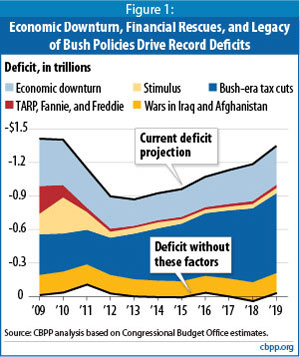
Flickr/<a href="http://www.flickr.com/photos/moon_child/3965679774/">moon child</a> (<a href="http://www.creativecommons.org" target="_blank">Creative Commons</a>).
Some articles make you less informed after you read them. Exhibit A is today’s New York Times story on the federal debt limit, which was raised last night. Here’s one paragraph that illustrates the problem:
Lawmakers quickly returned to partisan sniping before voting 218 to 214 to raise the federal debt limit, with each party blaming the other for running up the national debt over the last decade.
The article then continues on for another thirteen paragraphs without even attempting to inform the reader about anything other than the two parties’ talking points. At no point does the Times let readers know that which party is mostly to blame for running up the national debt is an empirically verifiable fact. It’s not a matter of partisan opinion. The Times could have even gone to its own reporting on this subject. In June, the Times ran an article by David Leonhardt explaining that most of the deficit is due to the recession and the Bush tax cuts—not overspending by Democrats in Congress, President Obama’s budget, or even the bank bailouts. If the author wanted some partisan balance, he could have mentioned Leonhardt’s conclusion that Obama doesn’t have much of a plan for closing the gap. 
The article could also have referred to this study by the Center on Budget and Policy Priorities, which was conveniently released just yesterday. It’s called “President Obama Largely Inherited Today’s Huge Deficits: Economic Downturn, Financial Rescues, and Bush-Era Policies Drive the Numbers.” It even comes with a pretty chart, which you can see to the right.
Times readers who relied on this failbag of an article are now less informed than they were before they read it. For all those readers know, President Al Gore and Speaker of the House Dick Gephardt were the ones running up the deficit after Clinton left office.
Why even bother writing the article if you’re not going to try to adjudicate a factual dispute? Next time, the Times should simply republish the Democrats’ and Republicans’ press releases and be done with it. FAIL.











